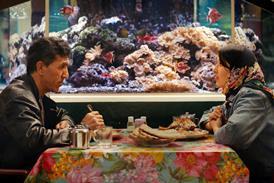Dir: Jia Zhankg-Ke. Chi. 2006. 107mins.
The decision of the Mostradel Cinema to screen Jia Zhankg-Ke'sStill Life in the prestigioussurprise competition film slot at Venice - and then slap its two press andindustry screenings on at 11pm and midnight respectively - is not going to dothe director nor his film many favours from critics. With even less of anarrative than his previous work like TheWorld, and more than a little too faithful to its English title, thissedentary look at a key social-economic moment in modern China plays like adocumentary interspersed with fictional ingredients. As such it feels very muchlike a companion piece to Jia's other
Though short, by Jia's standards, StillLife is nevertheless a slow, elaborate, thoughtful reflection around thefamous Three Gorges Hydro Project and the gigantic dam built on the riverYangtze, said to be the biggest in the world. A major source of energy for thefuture, its construction has submerged the surrounding area, especially the 2,000-year-oldcity of
But while Still Life covers an interesting theme,it is one that will not gain much of an audience beyond festivals or very specialised programming. Jia'spicture further explores the themes already brought forward in Dong, dedicated to painter Liu Xiaodong and the series of portraits he created of workersin Fengjie. One suspects that it and its fictionalcounterpart may carry more of a charge when programmed together as anthropologicalstudies, either at niche events or on ancillary.
To be accurate, Still Life has not one but two plots,whose only common denominator is their background: the city of
In the first strandHan Sanming (the eponymous actor is a former minerassociated with Jia's films since 2000), a miner fromthe north, comes to Fenjie to find his estranged wifewho he has not seen for the last 16 years, and his daughter, who is by now anadult. He roams around the collapsing city, holding in his hand a piece ofpaper and searching for addresses that no longer exist because of flooding.
Meanwhile the cameratrains on the scene behind him, as human hands tear apart factories andbuildings, some of them still inhabited, while the hills around are increasinglysmothered by droves of cheap lodgings, arranged in huge, white, uniformlyshaped blocks.
But it is notonly the physical topography of Fenjie that has changed:progress has also put the entire mentality of the Chinese revolution intoquestion. People are being paid not to build, but to destroy, while turning aquick buck is now the law of the street. The influence of creeping bureaucracyon one hand and flourishing enterprise on the other are also duly noted by thedirector.
Eventually Han findshis wife: when he is told he has to wait until his daughter returns - she hasbeen evacuated to another city - he takes a temporary job, like all the otheroccupants hacking away at walls of former homes.
The second plot strandfollows a nurse, Shen Hong (Zhao Tao), coming to Fangjie to look for her husband, who has been away fromhome for the last two years. It turns out that now he is a busy executive witha car and a life of his own, and there is nothing more that can keep theirmarriage going. The two plots have nothing in common, but for the background,which in both cases appears to be more the film's raison d'etrethan the characters themselves.
Following the twoprotagonists, Jia's picture inevitably leads toreflections on the actual meaning of progress and the sadness of man-madedestruction evolving before our eyes. Walls collapse and towers are blown up,which might be essential for the progress of humanity but at the same is also acultural and human cataclysm.
As such the lossof these buildings and monuments symbolises the everlasting destruction of thepast and the absence of a way of life. Deprived of their roots, more people in Fangjie become wandering waifs, chasing the best offer theycan get in exchange for their services.
But such themesdo not jump out from the screen, and instead Jia'sunderstated approach forces the audience to walk the additional mile and reach theseconclusions on their own.
Photography playsup expertly shot exteriors, the imposing scenery and some quiet, intimate andmoving moments with its subjects, although the lit interiors are lesssatisfactorily. Editing ensures the feature unfurls at a leisurely pace.
Production company
Xstream Pictures
Executiveproducers
Chow Keung
Dan Bo
Ren Zhonglun
Producers
Xu Pengle
Wang Tianyun
Zhu Jiong
Screenplay
Jia Zhang-Ke
Cinematography
Yu Likwai
Editor
Kung Jinlei
Production design
Liang Jindong
Liu Qiang
Music
Lim Giong
Han Sanming
Zhao Tao



















No comments yet